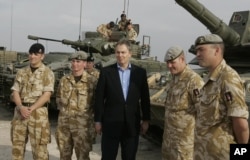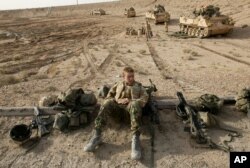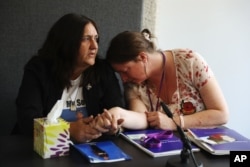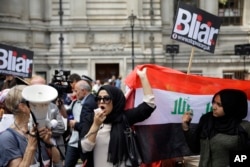The invasion of Iraq 13 years ago by an American- and British-led coalition was “unnecessary” and Iraqi dictator Saddam Hussein represented “no imminent threat” to Britain or the Western powers, according to a long-awaited official report into Britain's involvement in the Iraq War.
The inquiry led by John Chilcot, a former top British civil servant, heaped blame on politicians, intelligence officials, diplomats and generals for their role in the invasion and for the conduct of the years-long military operations by Britain’s forces, mainly in the south of Iraq.
In a scathing appraisal, Chilcot told a packed news conference in London that the planning and conduct of the military intervention was seriously flawed and “went badly wrong, with consequences to this day.” He referenced the recent suicide bombings in the Iraqi capital, Baghdad, that left more than 250 people dead.
“We have concluded that the U.K. chose to join the invasion of Iraq before the peaceful options for disarmament had been exhausted," Chilcot said. "Military action at that time was not a last resort.”
As the inquiry’s chairman explained the broad aspects of the monumental report, journalists continued to pick through the evidence and findings contained in 13 volumes.
Justification for invasion
Much of the Chilcot report focused on the legal basis and intelligence justification for the invasion. The report excoriates then-British prime minister Tony Blair, his ministers and the intelligence services, saying their justifications for the invasion were “far from satisfactory.”
In explaining his decision to join the United States in the intervention, Blair told Britain’s parliament, “Iraq has biological and chemical weapons.” The claim was crucial in persuading a majority of British lawmakers to endorse the country’s participation in toppling Saddam Hussein.
On Wednesday, Blair took responsibility for taking Britain into war, expressing "more sorrow, regret and apology that you can ever know or believe." However he insisted the world is a better place because of the removal of Saddam.
After seven years of investigation by the inquiry, Blair’s case for the war, a conflict that led to the deaths of 179 British soldiers as well as hundreds of thousands of Iraqis by the time British forces withdrew, was laid bare Wednesday.
Among the key findings of the investigation, which has lasted longer than Britain's combat operations in Iraq and was set up by Gordon Brown, Blair’s successor:
- The Blair government helped to undermine the authority of the United Nations Security Council by acting without securing majority support for military intervention
- The invasion was based on “flawed intelligence and assessments” that went unchallenged and “certainty over WMD was not justified”
- Military intervention was launched before all peaceful options had been explored
- Risks to British military personnel were inadequately planned for by the government and the country’s generals
- Britain’s legal basis for intervention was “far from satisfactory”
- Planning for post-war Iraq was “wholly inadequate”
The inquiry did not find that the Blair government sought to shape or influence the intelligence services’ assessment of Saddam possessing WMD's – a conclusion that some of the families of dead British soldiers took issue with within minutes of the publication of the report.
Blair strikes back
Blair issued a defiant statement Wednesday, saying, “The report should lay to rest allegations of bad faith, lies or deceit. Whether people agree or disagree with my decision to take military action against Saddam Hussein, I took it in good faith and in what I believed to be the best interests of the country.”
He noted the report found that “there was no falsification or improper use of intelligence.” He noted also the inquiry concluded that he had not entered into a secret deal months before with then-U.S. president George W. Bush to invade, come what may.
Blair, however, acknowledged, “The report does make real and material criticisms of preparation, planning, process and of the relationship with the United States.” He added, “I will take full responsibility for any mistakes without exception or excuse.”
To a packed House of Commons, Prime Minister David Cameron said the government will study the voluminous report and that any future interventions must have proper planning; but, he warned that the report shouldn’t deter Britain from interventions. “There are times when interventions are necessary,” he said. “It would be wrong to conclude that intervention is always wrong.”
Cameron also said it would be wrong to conclude that Britain should not support America. He highlighted the importance of Britain’s special relationship with the U.S., adding, “Britain and America share the same fundamental values.” He also said, "Our partnership is vital."
Labor Party leader Jeremy Corbyn said the intervention was “an act of military aggression launched on a false pretext” and it fueled and spread terrorism. He called for a more “open and independent relationship with the United States.”
Extensive investigation
Evidence for the inquiry into Britain’s most controversial military engagement since the end of the Second World War was drawn from more than 150 witnesses. More than 15,000 documents were published by the inquiry Wednesday, including 29 memos from Blair to Bush. The American president’s replies have not been published following discussions with U.S. and British authorities.
The length of the inquiry has been the butt of national jokes. Delays were caused by a long wrangle with the government over access to documents and their declassification, and later it was held up by the death of an important inquiry member, historian Martin Gilbert.
The process was prolonged by months because people the inquiry planned to criticize were given the chance to comment before the finalization of the report, which runs to 2.6 million words, four times the length of Tolstoy’s novel War and Peace.
It remains unclear whether the report will help the country shake off the legacy of the Iraq War. The discredited evidence that was used to propel the country into the invasion has done much to fuel general public skepticism since the war of official expertise – that in turn fed into public disdain of the government’s case for remaining in the European Union and could have helped the Leave campaign secure a majority in the June 23 referendum for Brexit.
Conclusions
The report’s conclusions also seem unlikely to ease disquiet about the Blair government’s interaction with the intelligence services as it shaped a broad case for war. Nor will it head off growing calls for Blair to face legal repercussions.
The inquiry did not express a view on whether military action was legal. Chilcot told journalists only a court could make that judgment. Some families of British soldiers who died in the Iraq War are discussing with lawyers the possibility of taking civil action against Blair and other ministers.
Retired General Michael Rose, who has been advising families, says action might be taken for what he calls “malfeasance in a public office.”
Some left-wing Labor Party and Scottish Nationalist lawmakers say they might seek to impeach the former prime minister.
The report could trigger prosecutions at the International Criminal Court at The Hague of British soldiers for incidents of war crimes and prosecutors there said they are scrutinizing the report; however, chief ICC prosecutor Fatou Bensouda has said it is unlikely that any action would be launched against Blair, saying the court doesn’t have the power to prosecute the crime of aggression.
Sarah Helm, a former journalist and wife of Blair’s chief of staff, Jonathan Powell, says that Blair realized the war might destroy his reputation. Listening in on a phone conversation between Blair and Bush, she says the British leader worried that the war would be “my epitaph.”









